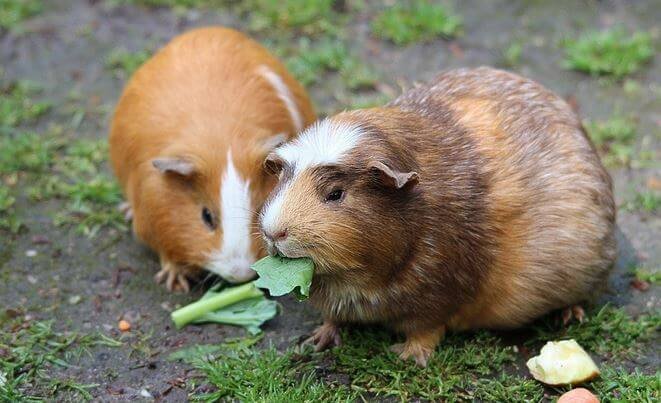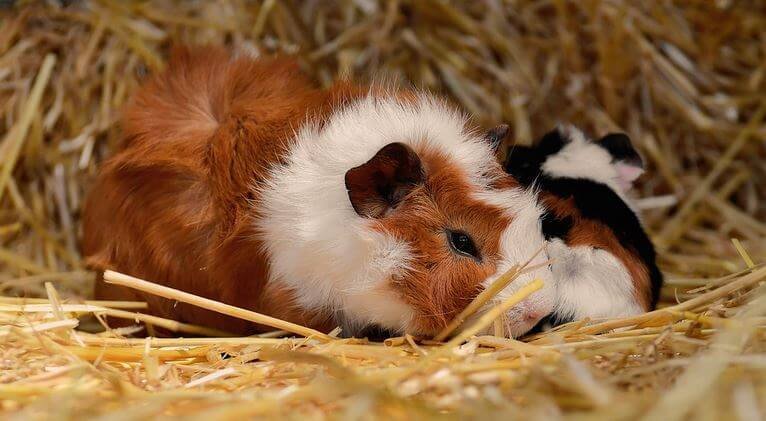The gestation period for guinea pigs stretches out between 59-72 days. This is a pretty long pregnancy duration considering that a guinea pig is a small mammal. As a guinea pig enthusiast, you should know the five pregnant guinea pig behaviors to watch out for so that you can help your pet live the best life during her pregnancy.
Generally, a pregnant guinea pig eats more than others, thanks to the babies forming in her belly. She’s mostly anxious and restless and keeps moving from one point of the cage to another. The guinea pig could be aggressive when you attempt to hold her.
Read on to learn the most common behaviors of your guinea pig in her pregnancy journey. You will also learn how to care for her in the best way possible.
5 Common Pregnant Guinea Pig Behaviors to Look for
During the early stages of the pregnancy, guinea pigs may not show any considerable pregnancy signs. That doesn’t matter, though. Soon, you will start to notice the following behaviors:
1. High Food Intake

Increased food intake is a primary signal that the guinea pig is pregnant.
Remember, eating more than usual could also result from low prevailing temperatures. However, if this is the case, you’ll realize that all guinea pigs consume more food than usual.
A pregnant piggy consumes more food because the extra food goes into baby nourishment. Therefore, you should support such a guinea pig by supplying more food in the bowl to meet the new feeding habit.
Pregnant piggies are expected to eat more due to the several fetuses in their bellies. These fetuses can only get nutrients from the mother.
As a responsible pet parent, you need to understand the feeding needs of your guinea pig. Ensure to provide a balanced diet rich in vitamin C and calcium to support the growing fetuses.
While it’s essential to provide enough food to ensure the pregnant piggy eats to satisfaction, be careful not to overfeed her. You don’t want to introduce overweight issues that would be a mountain to climb.
Also Read: Is My Guinea Pig Dead or in Shock? (Best Ways to Differentiate)
2. She Becomes Less Active
When you see your beloved guinea pig lying down more often than usual, there are chances she’s pregnant.
Lethargy is a common sign in pregnant piggies. However, it could also indicate an underlying condition or disease.
A healthy-looking guinea is usually active. When you call her, she should come running towards you and respond with squeaks. This changes when the guinea pig gets pregnant—she is not interested in interacting with you because there’s just a lot happening around and inside her body.
At this stage, she feels the best way to unwind from the undergoing processes is to lie down and relax. She may groom or simply have a nap.
3. Guinea Pig Is More Aggressive When Handled
If you love cuddling your guinea pig on your lap, stop that for now. Pregnant guinea pigs don’t love being handled. They become a bit aggressive and resist attempts to pick them up.
Don’t be surprised to experience rejection from your guinea pig. The mood swing is a temporary thing that ends when your little furry friend is done carrying the pregnancy.
But even during this time, learn different ways of reaching out to her to feed her or clean the cage. You can use treats to try and talk to her and keep her happy throughout the pregnancy.
4. Increased Water Consumption

A guinea pig with younglings growing in her belly drinks more water. The importance of water in the guinea pig’s health cannot be underestimated.
Therefore, ensure to refill water bottles with clean, fresh water regularly. The general water intake requirement for guinea pigs is 80 to 100 milliliters daily. Pregnant guinea pigs will drink more water.
Don’t stay long before changing the water because a pregnant guinea pig may refuse to drink any contaminated water leading to dehydration. You don’t want to see your piggy suffering from dehydration, especially when she’s pregnant.
Find Out: How to Help a Dying Guinea Pig in 7 Easy Ways
5. Guinea Pig Is Protective of Her Space
When pregnant, a guinea pig will not want others to intrude on her space. She will fight off any cagemates that try to disturb her peace.
That’s why it’s recommended to transfer other guinea pigs to another cage. Make sure the pregnant guinea pig is in a separate space. Being alone guarantees a sense of peace and a stress-free, healthy pregnancy period.
How Long Does It Take for Guinea Pigs to Show Pregnancy?
It takes about 2-3 weeks for the guinea pig to show pregnancy. Signs are not easily noticed during the first two weeks. The animal may still act the same as when it’s not pregnant.
In week four going forward, physical and behavioral signs become apparent.
You may start noticing a gradually distended abdomen. When this happens, you can gently feel the piggy’s belly to check for lumps that indicate mid-pregnancy.
Guinea pigs are not interested in the nesting business. Therefore, you shouldn’t expect yours to nest in readiness for delivery.
Notably, the gestation period of a guinea pig is comparatively long (59-72 days, as seen earlier). This explains why pregnancy signs might take some time before they start appearing.
You need patience and close monitoring. Taking your guinea pig to the vet for expert diagnosis is the ultimate recommendation to know anything related to the pregnancy of your little furry friend.
The vet will provide valuable feedback regarding your guinea pig’s pregnancy. With that done, you’re assured of a safe gestation.
During the long gestation journey, provide all the essentials the piggy needs. From proper feeding to handling and enhanced safety, this is the time you want to give the best care for your little furry companion.
For instance, feed your guinea pig the following;
- Alfalfa meal
- Soybean meal
- ground whole oats
- Ground whole wheat
- Calcium carbonate
- Mineral and vitamin premixes
While handling the piggy, be gentle to avoid causing any harm to her. You should also furnish her cage with soft bedding for the comfort and safety of the forthcoming younglings.
Can You Touch Guinea Pigs When Pregnant?
Although you can touch guinea pigs when pregnant, you should avoid too much touching and petting. The guinea pig will try to avoid you as much as possible. Pregnant guinea pigs have a significant change of attitude and have problems interacting with people and other companions.
When pregnant, the guinea pig needs her space and privacy. Excessive lifting and touching unsettles and makes her anxious. She is probably uncomfortable about what’s going on in her, and the best care she can receive is giving her space to rest.
Moreover, you could easily stress her. A stressed guinea pig is vulnerable to diseases like toxemia.
The other reason you should limit grooming your pregnant guinea pig is her sensitive skin and coat. Even when she is not pregnant, gentle cuddles are recommended to avoid abrasion on the delicate skin.
If you really have to touch your guinea pig more often, do it while the pregnancy is still in the early phase. In the last two weeks of pregnancy, reduce handling considerably. You may only carry her in a box rather than touching or holding her around.
Guinea Pig Labor Sounds

Usually, a guinea pig will produce labor sounds when she experiences labor pain. She will squeak or squeal because due to the pain in her muscles and bones. Squeaking also indicates that she’s scared of what’s about to happen.
When she squeals, that will take only about 10 minutes before the pups come out. You should contact your vet immediately for expert help if she squeals longer while contracting her muscles.
Labor is the penultimate stage of the birthing process—it lasts about 20 minutes. Make sure not to interfere with the birthing process. Let the guinea pig push out the pups naturally.
Moreover, remember not to touch the pups lest the mother rejects them. Usually, she cleans up the pups as they come out and also after she completes giving birth.
Best Ways to Prepare for a Guinea Pig’s Delivery
You should make adequate prior arrangements in preparation for receiving pups. The objective is to ensure your guinea pig and the forthcoming pups are as comfortable as possible.
Some things you can do include:
1. Provide Enough Privacy for Your Guinea Pig
When your guinea pig is exposed to the ‘world,’ she may feel extremely anxious. She wants a quiet, calm, and safe environment.
You can cover the end of her cage to keep out excess light and provide a conducive delivery environment.
2. Separate Your Pregnant Guinea Pig From the Rest
Ensure a stress-free space for your pregnant guinea pig. This means separating her from the rest of the team.
When pregnant, guinea pigs tend to be protective of their space. They barely spare a mate that may attempt to cross her territory. You don’t want to encourage such behavior by confining the pregnant guinea pig with others.
3. Give Your Guinea Pig Comfortable Bedding Material
Look for comfortable bedding for your guinea pig’s delivery. The material should be soft, absorbent, and easy to clean.
Abrasive material can irritate the guinea pig and even choke the younglings. The bedding should also provide enough warmth.
The recommended temperatures for a guinea pig’s birthing process is between 65 and 70℉ (18.33 and 21.11℃).
Final Thoughts
Keeping an eye on your pregnant guinea pig behavior is an exciting journey filled with anticipation and wonder.
By being attentive to their behaviors, you can decipher the subtle hints that they give, guiding you toward the arrival of new life.
From increased appetite to unusual vocalizations and physical changes, these five sure pregnant guinea pig behaviors serve as a window into the miraculous world of nature.
Therefore, embrace the role of a vigilant caretaker, and marvel at the marvels of life unfolding right before your eyes.

